By: Izumi Hasegawa February 20, 2024
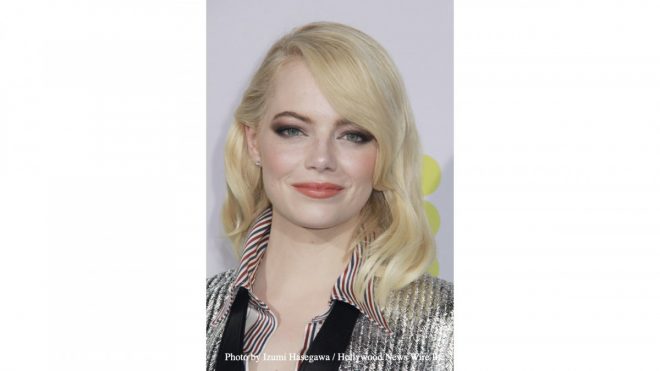
Emma Stone is a true artist. She never hesitates to surmount huge challenges. Despite all her years in Hollywood as an established actor, she still remains the girl next door.
In Poor Things, she played an incredibly unique character, Bella, which totally blew us away. How did she prepare for the role?
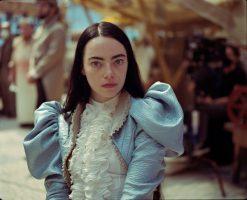
Q: What made you decide to take the risk of playing such an unconventional role?
ES: Oh, there wasn’t even a second thought. It was like the greatest thing ever. She’s my favorite character of all time. And it was with Yorgos (Yorgos Lanthimos, director). I was like, done, great. It was not a hard decision. [laugh] I felt so lucky.
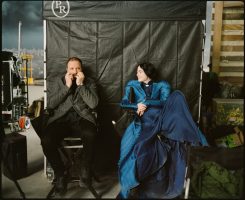
Q: How hard were the character to play?
ES: I’m a tough person to ask because I find it, like, so embarrassing when actors say that their job is hard. ‘Cause I just think it’s, like, humiliating. Even though it is. Like, you’re really tired and, you know, all of that. And you’re in this environment and, you know, there are days where you’re really hard on yourself, and you care a lot about what you’re doing. But, to say, like, oh it’s so hard to be an actor is crazy to me. So, with that said, sure I found some days hard [laugh] but not really, you know what I mean. It’s so much fun. It’s such a joyful, lucky thing to get to do. And she was such a joyful character to play that, even when it was, you know, a more challenging day or I was being hard on myself or whatever it might be, it’s always a gift. And really, this cast and our crew and, you know, being with Yorgos again, it’s like, it’s the best.
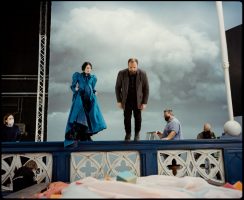
Q: How did you approach preparing for Bella?”
ES: Just by trying to remove as much judgment and shame as possible because I think that it was actually more an undoing than a doing. Obviously, the physicality and the language and all of that was something that we worked on pretty extensively because we need to, and we needed to understand her staging as the film progresses, and the story progresses. But more than anything, it was just sort of, like, letting go of things because Bella is pure joy and curiosity and doesn’t have shame and doesn’t have trauma. And it’s hard to find an adult that hasn’t gone through things and has, you know, certain Pavlovian responses to certain things or certain judgments about themselves or others. And that was the great gift of playing her, was that she just doesn’t. She just lives in a place of discovery. And so, that was the biggest part in my mind [laugh], I think, of preparation to play her.
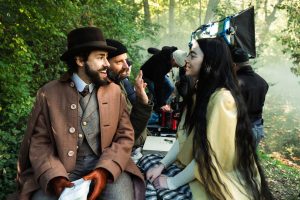
Q: What is the best thing about working with Yorgos Lanthimos?
ES: I think we just truly love each other. I think we really understand each other, and we get along really well. But I think we both also have a lot of respect and admiration for each other, and what we do. And I feel very much like I can completely trust him as a director and collaborator, and that’s so rare as an actor, to be able to just totally give yourself over and know that you’re (delete your) being protected in that way. And that the story is being protected. And we can make fun of each other. And we can fight, and we can just have, like, a legitimate relationship, which is incredible, and why I think I love working with him time and again. And he loves to build kind of a company, you know, of not just the actors but the crew. It’s the same people that kind of keep coming back, and you feel safer with everybody because of that and closer to everybody. And there’s a real shorthand, and it’s just, like, it’s my favorite. It’s the best.
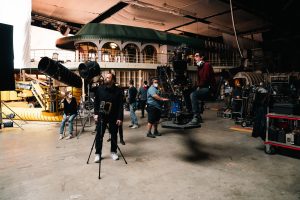
Q: Talk about the evolution of your character from the physical elements to her way of thinking, and how you worked with Yorgos to get there. There’s a lot to track over the course of a shoot, particularly in the way that Bella evolves.
ES: Yeah, we basically did it in just, kind of, a very logical way. Just staging with her physicality and her language, and then the rest of it. Neither Yorgos nor I really like to talk a lot about the, sort of, psychology of the character and, like, what’s happening internally and all of that. The exterior is sort of there, and then that’s my work to do more internally. So, that’s kind of what we did. We just sort of parsed out how she would develop in these stages so that we could jump from day to day. And if we needed to change where we are in the story, we kind of knew how she would be developing. And then, I mean, in my own mind, that’s for me to know and you to find out. [laugh] So stupid.
Poor Things is playing in theatres.
Editing by Seana Magee
